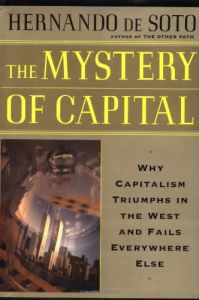Join getAbstract to access the summary!

Join getAbstract to access the summary!
Hernando de Soto
The Mystery of Capital
Why Capitalism Triumphs in the West and Fails Everywhere Else
Basic Books, 2000
What's inside?
Imagine the global impact of a legal system that allowed the poor to convert their extralegal assets to useable capital.
Recommendation
Hernando de Soto’s ideas cannot and should not be ignored. This book will open many eyes to the nature of capital. The author suggests a radically simple yet enormously challenging way of bringing the world’s impoverished billions onto the track of capitalism and development: give them legal property rights to what they “own.” The author’s intriguing case is that a lack of property rights - not a lack of entrepreneurial zeal or competence - stymies development in the former East Bloc and Third World countries. This seemed to be a shockingly original notion when the author first propounded it in his bestseller The Other Path, and it still does. If the book has a flaw, getAbstract.com warns, it is that the author’s undisguised missionary ardor sometimes makes one wonder whether he is merely a zealot. Even if he were one, the book would merit reading.
Summary
About the Author
Hernando de Soto is President of the Institute for Liberty and Democracy (ILD) headquartered in Peru. Time recently named him one of the five leading Latin American innovators of the century. He was Personal Representative and Principal Advisor to the President of Peru and initiated economic reforms.


















Comment on this summary
It was a deliberate reference to Shining Path in Peru.